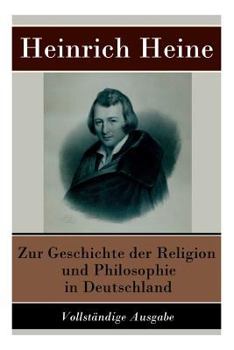Zur Geschichte der Religion und Philosophie in Deutschland
Select Format
Select Condition 
Book Overview
This volume presents a colourful and entertaining overview of German intellectual history by a central figure in its development. Heinrich Heine (1797-1856), famous poet, journalist, and political... This description may be from another edition of this product.
Format:Paperback
Language:English
ISBN:8026856813
ISBN13:9788026856818
Release Date:October 2018
Publisher:E-Artnow
Length:72 Pages
Weight:0.24 lbs.
Dimensions:0.1" x 6.0" x 9.0"
Related Subjects
History Literary Literary Criticism & Collections Literature Literature & Fiction PhilosophyCustomer Reviews
1 rating
A must read for students of Germany, Philosophy, and/or Religion
Published by Thriftbooks.com User , 19 years ago
Heine's book is written in the most lucid and beautiful prose I have come across in a long time. No wonder, Heine was a celebrated poet and literary critic, not a philosopher or theologian. However, the philosophy and theology comes through beautifully as well, certainly with no more idiosyncrasies than in any philosopher who writes of prior thinkers. He writes with the general audience in mind and does so brilliantly. If you have any interest in German thought (Religious or Philosophical) up to the 1830s, this is a must read. Heine breaks it up into three eras, the early period of high-Germanic culture and Catholic incursion, the Religious revolution of Luther, and the Philosophical revolution begun by Kant and completed by Hegel. Frighteningly, Heine, in the 1830s, writing to a French audience, concludes the book by warning that the Philosophical revolution was sure to be followed at some point by a political revolution, the likes of which would make the bloody terror of France (1789-1790) pale in comparison. The protagonist of this impending political revolution, the 'Philosopher of Nature,' is in some sense Schelling. But he failed to make his philosophy clear and fell into rather poor poetry (at least according to our poet and critic, Heine). Nietzsche may be a fairer candidate for our Philosopher of Nature, 'allied ... with the primitive powers of nature' (p.159). But Nietzsche is far cleverer than this. He points not to ol' Germany, but to the Greeks for his pantheism. Hitler himself may be a truer candidate for our 'Philosopher of Nature'. He who so brilliantly combined the old Germanic eagle, symbol of might, and the Hindu swastika (which in Sanskrit means literally 'own-goodness') and the label 'Aryan' (which means 'Noble one'). Hitler's on-the-street cronies were the 'Stormtroopers' and his war began with a bolt of lightning, the Blitzkrieg. It is with Hitler indeed that the 'demoniac forces of old German pantheism' (p.159) were finally conjured up into modernity. So in this great book we find not only brilliant prose and lucid explication of German philosophy and theology, but also indeed a bit of prophesy.





